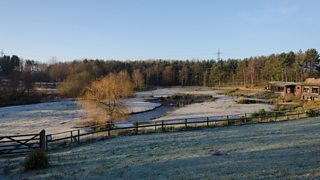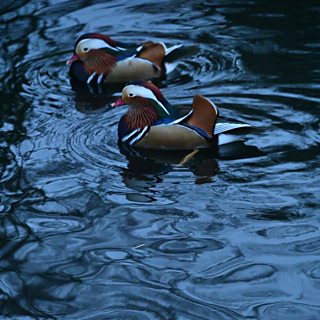By Leanne McCormella, Comms and Marketing Executive at Washington Wetland Centre
Experiencing nature is an immersive affair. It comes at you from all angles, overwhelming your senses, and to give yourself over to it is a truly special thing.
But what if you don’t have full use of all your senses? Is it any less magical to be amongst wildlife or in the great outdoors? Or does it open up a different way to explore the wild world?
Photographer Alex, from Sunderland, was born with Bardet Biedl syndrome; a genetic condition which causes a range of physical issues, including blindness.
The talented 25-year-old has no peripheral vision and describes his eyesight as ‘like a dot’ compared to normal sight. But this doesn’t stop him regularly exploring – and enjoying – the diverse habitats of Washington Wetland Centre, with both his mum and his camera in tow.

Washington Wetland Centre in winter by Ian Henderson WWT
“My mum is my main carer when I’m out and about, and with my camera, he explains.
“When I know what I want to photograph, I can feel around my camera as I know where all the buttons are. I ask for help when I need it to check my focus etc, as sometimes I’m not sure if it’s my eyes or the lens which is the issue.
“Because of my sight loss I tend to listen a lot more to sounds of wildlife and I know in my mind what kind of a picture I am trying to take and the WWT has all of this for me.”
The story of Alex’s passion for wildlife photography and how he navigates our wetlands to capture his incredible images will feature on Winterwatch on Tuesday 25 January at 8pm.

Mandarin duck by Alex taken at WWT Washington
“I enjoy coming to the WWT because it is very local, no two days are ever the same and the surroundings are very familiar to me, he adds.
“There are so many different trails to walk and hides to visit, there is always something different to see. I love to visit the saline lagoon and I love the Hawthorn Hide as you see such a variety of wildlife.
“It gets me outdoors and I feel safe here and the staff are always friendly and very helpful. I get plenty of exercise and I can go at my own pace because of my mobility, which can slow me down.”
Despite frequent visits to our Lagoon View hide, Alex had yet to achieve his goal of photographing an elusive kingfisher, a bird which often thrills visitors by perching and hunting in front of the hide windows.

Image taken by Alex at the Hawthorn Wood at WWT Washington

A jay photographed by Alex at WWT Washington
The Winterwatch crew accompanied him on a wander around site to see if this dream might eventually become a reality with the cameras rolling…be sure to tune in on 25 January at 8pm to find out if it did!
Three ways to enjoy nature with other senses than sight
Feel the heightened sensation of raindrops. Get your wellies and waterproofs on and head out after it’s rained to splash in the puddles. Watching raindrops fall on puddles and noticing the shapes they make can be mesmeric, especially if you’re warm and dry in suitable clothes. But you can also feel the satisfying squelch of mud as it seeps around your wellies, and be glad that you’ve still got dry feet! If it’s raining, you can seek shelter and listen to the soothing rhythm of the drops falling.
Listen for migrating birds. During late winter and early spring, you can often hear birds migrating across the sky, and with enough practice you can identify them. Birds sometimes migrate at night, a magical thing to listen to if you’re lucky enough to be out under canvas or have a garden that happens to be under a flight path. Often birds will use wetlands like those at WWT Washington to fuel up for such huge journeys. You can practice listening to their calls and eventually they’ll become easier to identify.
Smell the subtle scents of winter. It might not be the best season for smelling the flowers, but you can still practice being mindful and picking up different fragrances if you give it your full focus: the leaves of an evergreen tree, the salty scent of the sea, the crisp freshness of new snow, the delicate floral notes of an early crocus, even the smell of the earth when it rains after a dry spell. This scent even has a special name: petrichor.

Redshank at Washington Wetland Centre by Ian Henderson WWT
